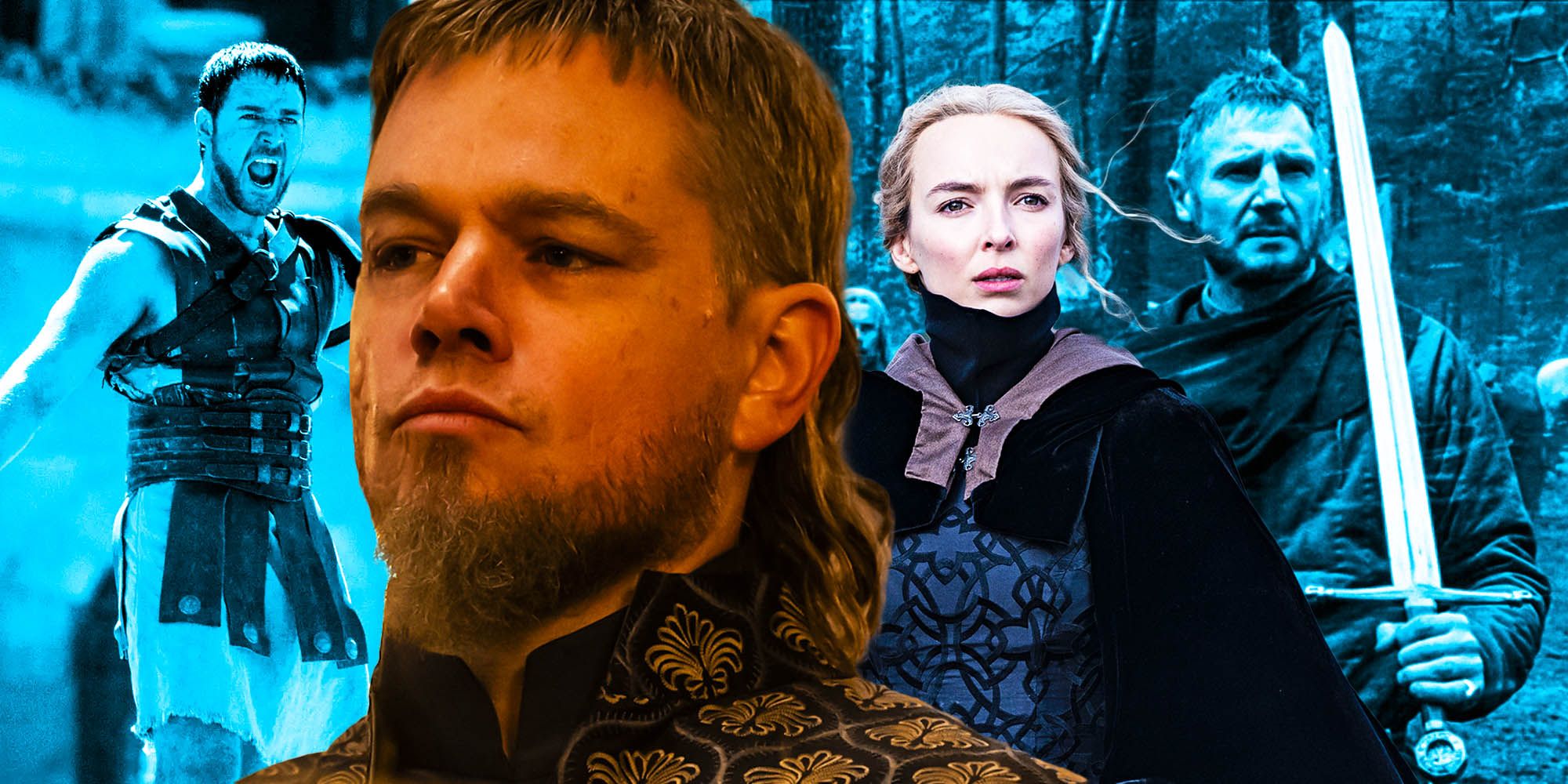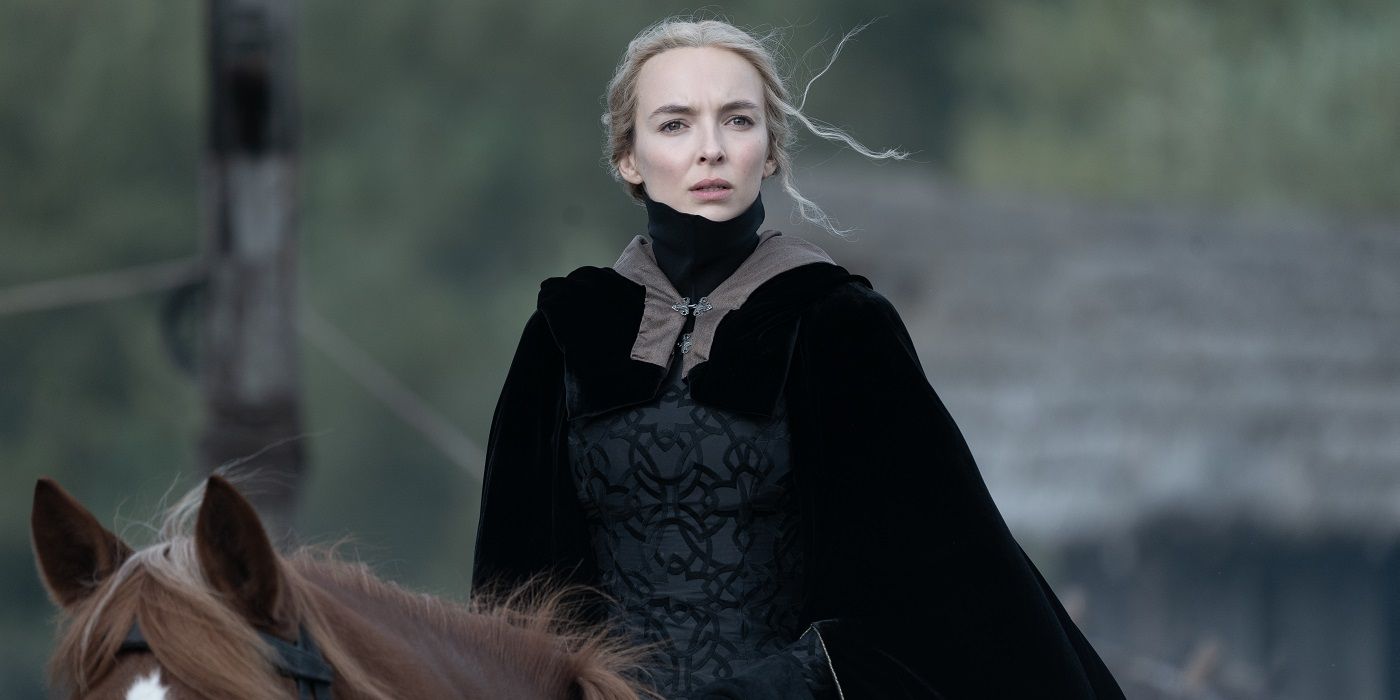Ridley Scott's The Last Duel is soon to hit theaters and here's how the reviews compare to his other major historical movies. Though he may be best known to modern audiences for his sci-fi movies like Alien, Blade Runner and Prometheus, Ridley Scott also has an extensive list of historical movie epics under his belt, as well, including Gladiator, Kingdom of Heaven, and 2010's Robin Hood. The Last Duel isn't even his first or second movie set in the medieval era. Now 83 years old, Scott still continues to be one of Hollywood's most versatile directors.
Scott's The Last Duel tells the true story of the last officially sanctioned judicial duel in France's history in 1386. It was a duel fought between two knights and close friends who had become bitter enemies. Sir Jean de Carrouges (Matt Damon), an uncouth but fiercely brave knight and Jacques le Gris (Adam Driver), a clever strategist and libertine, met in a fight to the death after Jean's wife, Marguerite de Carrouges (Jodie Comer) accused le Gris of raping her one day while de Carrouges was away on business. As they could not come to a satisfactory jury result, and all three refused to recant their stories, King Charles VI (Alex Lawther) decrees they will settle the matter via the by-then-rare solution of a duel to the death.
It's Ridley Scott's first historical epic since 2014's Exodus: Gods and Kings, and reviews have been somewhat mixed, though most critics agree it's one of Ridley Scott's better movies in years. Currently, The Last Duel holds a strong 87% critics rating on Rotten Tomatoes and an average score of 7.5/10. Compare that to Scott's last few pure historical epics: Exodus: Gods and Kings (30%), Robin Hood (43%), Kingdom of Heaven (39%), and Gladiator (77%). Shockingly, The Last Duel movie is a full 10% higher than Scott's acclaimed classic, Gladiator, and still slightly higher than Gladiator's 7.3/10 average score. It's slightly incomplete to make a head-to-head comparison of those movies as Gladiator, released in 2000, has twice as many reviews and a movie's Rotten Tomatoes score tends to go down a few points as more reviews are later added. However, it's clear that this is one of Scott's best movies in quite some time. Here's what some of the reviews for The Last Duel have to say.
I might even argue that it’s a meta-commentary from Scott aimed at those who embraced Gladiator but rejected Kingdom of Heaven. Either way, it’s an uncommonly engrossing old-school “movie movie,” complete with self-reflection of modern masculinity in the #MeToo era, when such things are in ever-shorter supply.
And it all leads up to the title duel which, even by the high standards set by Scott’s “Gladiator,” is what you’d call a humdinger...When it’s delivering what the best of Scott and company's work can do—and the imagery, much of it grounded in a palette that could be a tribute to its anti-hero, whose last name translates as “the gray,” is frequently startling—the commentary pursued by the movie’s scenario isn’t entirely subsumed, but it’s not paramount, either.
The steady unraveling of first impressions requires an unchivalrous running time of 152 minutes...But each act feels surprisingly brisk. Affleck and Damon have not collaborated as screenwriters since Good Will Hunting—another movie that mixed goofy ball-busting with darker emotional reckoning—and their creative partnership yields a similarly invigorating mix of tones here.
Scott’s gift for staging violent historical spectacle, so memorably displayed in Gladiator and Black Hawk Down, is on full display in the bone-crunching and genuinely suspenseful mounted battle that ends the movie.
[D]espite a lengthy 152-minute runtime, the wait is absolutely worth it to see Scott flex his action muscles in a way not seen in mainstream Hollywood filmmaking since Kingdom of Heaven. This is not the kind of romantic swordfight of something like Lord of the Rings, or the over-the-top focus on gore of Game of Thrones, but a grueling, brutal, slow fight to the death that is as unromantic as a movie can be, with each hack, slash, and stab carrying tremendous visual, auditory, and emotional weight behind it to the point where this critic felt almost tempted to look away during the fight.
Of course, not every critic was as enamored with The Last Duel, particularly how Jodie Comer was sidelined and Marguerite undermined. Scott had a tricky time balancing the feminist message of the film with realistically portraying how women were viewed in the 14th-century and where were criticisms he failed in that regard. Others pointed to The Last Duel's runtime, which some considered to be a bit too long thanks to the Rashomon-like plot device of unfolding the same events from a different character's perspective in each act.
It’s almost a shame when Scott reverts to form and finally brings out the lances and blades. While the climactic joust is masterfully wrought, it sidelines Comer, and you’re so galled by the self-aggrandising, testosteronal idiocy of the men participating that it’s a tough sequence to be thrilled by, despite the stakes.
There are limitations to the film’s structure. Damon, Affleck, and Holofcener save Marguerite’s perspective for last, in part so it can function like a damning rejoinder to the chapters before it—the woman’s side of the story, finally presented after two hours of the men’s blinkered sides. Yet that choice leaves Comer a little dramatically adrift: While Damon and Driver are gifted complicated (if ultimately unsympathetic) characters, she’s strategically denied much dimension until the home stretch—and by then, the film is focused almost entirely on her bravery as a victim stuck in a system stacked against her. The movie struggles as much as Carrouges and Le Gris do to really see Marguerite, at least outside the context of her ordeal.
The Last Duel is at its core the story of a medieval court case, and it can very much drag like one in many instances. The movie best sings when the director gets to its gutting third act and Matt Damon and Adam Driver’s friends-turned-rivals duke it out in the historical duel. There’s an otherwise iciness to the film (surely matched with the subject matter) that must be braved, and it doesn’t swing as confidently as Scott’s Best Picture winner, Gladiator.
Regardless, strongly negative reviews for The Last Duel are relatively few by comparison, and most criticisms of the film are balanced out by the other interesting things the movie has to offer, as Screen Rant's own review explains:
The buildup gives the title fight higher emotional stakes, turning it into a riveting spectacle rife with meaning. But the duel itself is less interesting than what happens before, with the script and the direction laying the groundwork in detail, allowing the audience to enter this world through the eyes of its characters, while also making sure not to excuse their behavior. The Last Duel might seem like a spectacle, teasing a gruesome duel to the death, but it's more of an intriguing character study.
Because of its repeated three-act structure, some may grow restless or bored. And general audiences who were expecting a pure Gladiator-style action movie will be surprised, and some no doubt disappointed, to find that The Last Duel is a movie with a lot more on its mind and far more to say than Russell Crowe's epic. But it's hard to argue with the strong reviews and The Last Duel offers inventive and strong storytelling from Ridley Scott coupled with some of the most pulse-pounding action sequences he's crafted in years.


